Mosquitoes are a summer nuisance, and homeowners often rely on spraying to keep the pests at bay. However, you may be wondering how long you should wait before going outside after the spray is applied. The length of time you should wait to go outside after mosquito spraying depends on the product that was used. Some products require a waiting period of several hours, while others only require a waiting period of 30 minutes. Always follow the specific instructions on the product label and the pest control team who’s done the service.
As the leader in pest control, let us share some insights about mosquito spraying and the best things you should do during and after the service.
Professional Mosquito Spraying You Can Trust
Mosquito spraying is an effective way to reduce the population of mosquitoes in an area. Mosquitoes can carry diseases such as malaria, dengue fever, and Zika virus, so reducing their numbers can help protect people from these illnesses.
Mosquito spraying helps to reduce the risk of insect-borne diseases by killing off other insects that might serve as vectors for disease transmission. It can also help reduce the number of biting insects in an area, which can make outdoor activities more comfortable. Finally, mosquito spraying can help to control populations of mosquitoes that might otherwise become pests.
What Should I Do During Mosquito Spraying?
When mosquito spraying is taking place in your area, there are a few things you can do to stay safe and protect yourself from exposure to the chemicals.
First, you should close all doors and windows in your home to prevent the spray from getting inside. If you have air conditioning, you should turn it off during the spraying process. You should also avoid being outside during the spraying process. Do not forget to bring outdoor pet food and water bowls inside. You should also cover outdoor toys, small pools, and fish ponds to prevent exposure to chemicals.
If you must go outside, be sure to cover your skin with long sleeves and pants. You should also wear a mask to avoid breathing in the spray. Finally, be sure to wash any exposed skin thoroughly with soap and water as soon as you come back inside.
What Should I Do After Mosquito Spraying?
After the mosquito spraying process is complete, you should open doors and windows to ventilate your home. If possible, you should also turn on fans to help circulate fresh air. You should wait at least 30 minutes before coming back inside.
Once you are back inside, be sure to wash any exposed skin with soap and water. You should also wash any clothing that was exposed to the spray.
Mosquito Spraying FAQs
What’s in Mosquito Sprays?
Most mosquito sprays contain a compound called DEET (N, N-diethyl-meta-toluamide). It’s the most effective mosquito repellent available, and it works by blocking the mosquitoes’ ability to detect either heat or carbon dioxide.
Other active ingredients found in some mosquito sprays include picaridin and IR3535. These compounds work by targeting different receptors on the mosquitoes’ antennae that are used for sensing host odors. In addition, citronella oil, which is a natural repellent that comes from plants, is also present in the spray.
How Effective Is Mosquito Spraying?
Mosquito spraying effectively controls mosquitoes, but it is not 100% effective. There are a number of variables that affect how effective it is, including the type of mosquito spray, the weather, and the conditions of the area where it is sprayed. The best way to determine whether or not mosquito spraying is effective in your area is to consult with your local health department.
Can Mosquito Spray Make You Sick?
It is possible to have an allergic reaction to mosquito spray or breathe in too much of the spray and experience temporary respiratory irritation. The main ingredient in most mosquito sprays is DEET, which can be toxic if ingested. Symptoms may include headache, nausea, dizziness, and difficulty breathing. If you or someone you know experiences these symptoms after using mosquito spray seek medical attention immediately. While the chances of becoming ill from using mosquito spray are low, it is important to take precautions and be aware of the potential risks.
What Time Of Day Is Best To Spray For Mosquitoes?
There is no one-size-fits-all answer to this question, as the best time of day to spray for mosquitoes will vary depending on the specific location and climate. However, our pest control experts agree that spraying during the early morning or evening hours is generally most effective, as this is when mosquitoes are most active.
Does Rain Affect Mosquito Spray?
Yes, it does affect mosquito spray. Mosquito sprays, like all insecticides, are designed to break down in the environment and become inactive over time. The rain will help speed up the process of breaking down the spray. In addition, rainfall can wash away mosquito sprays and larvicides, which can reduce the effectiveness of these products in controlling the spread of mosquitoes and vector-borne diseases.
Does Mosquito Spray Hurt Beneficial Insects?
One of the problems with mosquito spray is that it’s often not selective in what it kills. It can easily kill beneficial insects along with the mosquitoes. This is a big problem because beneficial insects are important for pollination and helping to control harmful pests.
Mosquito spraying is an effective way to get rid of mosquitoes and other pests around your home. If you are interested in having a professional pest control come to spray for mosquitoes on your property, please call us today. We would be happy to help you get rid of these pesky critters and create a safer and more comfortable environment for you and your family.
Pete’s Pest Patrol is the most trusted pest control expert in the community. We’ve been dealing with all types of pests for residential and commercial properties for years. Contact us to discuss the best option for your unique case!

